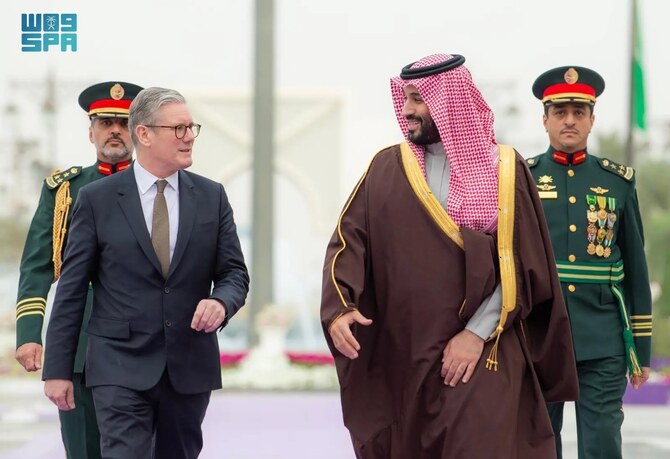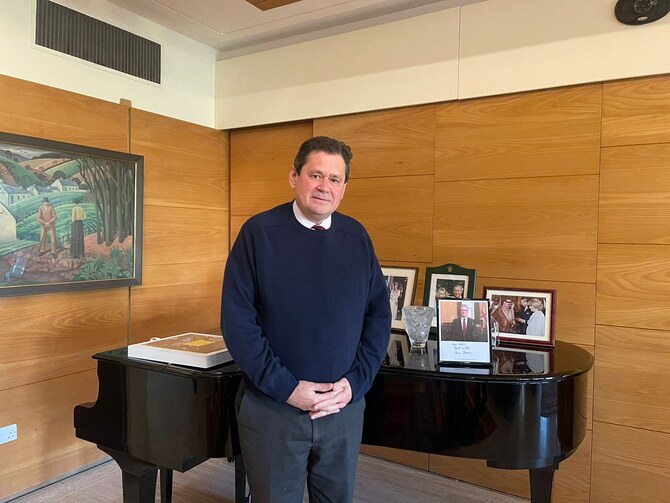RIYADH: Artificial intelligence is driving Saudi Arabia’s entrepreneurship growth, with startup founders using the technology to address local challenges, boost efficiency, and advance Vision 2030’s economic goals. Benefiting from supportive government policies and emerging talent, these startups are positioning the Kingdom as a rising global tech hub.
One such firm is AIYAH, which is using AI to bridge the gap between startups, talent, investors and academia. The company’s mission aligns with Vision 2030’s goals, supporting Saudization and offering a gateway to authentic Saudi experience.

“Accelerating the achievement of the goals of Vision 2030 has to be number one,” AIYAH co-founder and CEO Sahiqa Bennett told Arab News.
“That’s basically why AIYAH was built, to accelerate the process. Those goals are linked with innovation, getting innovative startups in or solutions that they are looking for and talent.”
Founded in 2024 by Bennett and Naila Kiani, AIYAH serves as an AI-powered talent solution and a gateway to the Kingdom’s innovation ecosystem.

AIYAH founders Sahiqa Bennett and Naila Kiani. (Supplied)
Before launching the platform, Bennett spent more than two years researching the virtual world and ways to connect it with the physical arena for human interaction.
Bennett explains that her decision to co-found AIYAH stemmed from frequent questions she received about her fascination with Saudi Arabia and its booming tech scene.
“Why are you looking to be in Saudi Arabia? Why come to Saudi Arabia so much, and what’s happening in the Middle East that’s not happening here?” she said. “People almost didn’t believe some of the things I was telling them.”
Through her research, Bennett was struck by how many people did not fully understand Vision 2030, despite being familiar with its broader concepts. Many were unsure of how to tap into the opportunities emerging within the Kingdom.

She notes that her research process included “talking to people in the Kingdom and out of the Kingdom, asking if they know enough about Saudi and Vision 2030.”
Several other factors influenced Bennett’s decision to co-found AIYAH, with one of the most pressing being the challenge of finding and placing the right talent.
She encountered many stories of recruiters attempting to fill thousands of positions — sometimes as many as 10,000 — but struggling to identify suitable candidates.
At the same time, she frequently heard from job seekers trying to enter the Saudi market through traditional platforms such as LinkedIn, only to receive no responses or interview opportunities.
“I thought I need to build the gateway that literally opens the door and welcomes you in, gives you a chance to see what’s happening, and accelerates how you get involved and how you become visible, and have a chance at least,” she said.
This disconnect between recruiters and job seekers revealed a broader inefficiency in the hiring process. Bennett emphasizes how difficult it is for applicants to stand out when they are competing with hundreds — or even thousands — of others for the same opportunity.
Saudi Arabia had an overall unemployment rate of 3.7 percent in the third quarter of 2024, down 0.5 percentage points from the same period in 2023, according to the General Authority for Statistics.

This improvement came alongside a rise in overall labor force participation — including Saudis and non-Saudis — which reached 66.6 percent, reflecting a year-on-year increase of 0.2 percentage points and a 0.4-point gain from the previous quarter.
On the employer side, Bennett notes that recruiters were overwhelmed. Many simply could not manage the volume of applicants, making it difficult to identify the right candidates amid overflowing inboxes and unfiltered submissions.
“There are so many parts to the recruitment process that are just so disheartening,” she said.
“We’re trying to put dignity back into the process,” she added. “It’s actually disheartening applying for jobs and not hearing back and getting the feeling that you’re not good enough.
“I’m trying to flip that around and say let the opportunities come to you, whether you are a startup founder, whether you’re an investor, or whether you’re talent. Let the pitch happen, and then you pick from the pool.”

AIYAH leverages AI to streamline connections between investors, employers and job seekers. Rather than requiring users to apply for hundreds of positions — often alongside thousands of competitors — the platform offers an AI-powered interview feature.
This tool allows individuals to present themselves through video, giving employers and investors a more personal and direct introduction. This innovation, Bennett explains, was inspired by a gap in existing platforms.
“I’m going to combine the best pieces of certain platforms,” she said. “I feel like there’s nothing that brings everyone together as a community — but with intention, community with intention.”
Expanding on what sets AIYAH apart from traditional job platforms such as LinkedIn, Bennett points to its proactive approach.
“How we are different is we are guaranteeing that everyone can do an interview. Come to the platform, register, and do an interview,” she said. “You don’t even have to wait for a job, introduce yourself and be proactive so that you get seen.
“And I think this is the biggest difference.”

Bennet acknowledges LinkedIn’s strengths, particularly in building human connections, but says its functionality in the hiring space leaves much to be desired.
“I think there are some great things about LinkedIn, but when it comes to recruitment and hiring, I call it a black hole — I call it where things get lost,” she said.
Bennet argues that while LinkedIn has not evolved significantly in two decades, the world — and its hiring needs — have.
“And that is the difference,” she said. “I feel that their models have not changed — LinkedIn is a 20-year-old business and they don’t need to disrupt or change because they are making money.
“However, the world has changed … and people’s needs have changed.”

She added: “I think the traditional model has been broken for a very long time. I think the human part of things has to really remain.”
Bennett says LinkedIn still serves a purpose when it comes to networking and social connectivity. But, according to her, in the realm of recruitment both job seekers and hiring professionals are growing increasingly frustrated with its limitations.
That commitment to accessibility is rooted in more than two years of research into evolving market needs. Since its recent launch, AIYAH has focused on bridging gaps between startups, talent and opportunity through a phased rollout strategy.
DID YOU KNOW?
• Saudi Arabia's employment rate dropped slightly to 64 percent in Q4 2024, down from 64.1 percent in Q3 2024.
• From 2017 to 2024, the average employment rate in Saudi Arabia was 56.7 percent, peaking at 64.7 percent in Q4 2023.
• The unemployment rate among Saudis rose to 7.8 percent in Q3 2024, up 0.7 percentage points from the previous quarter.
(Sources: Trading Economics & GASTAT)
In its first phase, the platform allows startups to join and job seekers to pitch themselves and apply for roles. The next phase will expand to include investors and employers, alongside partnerships with global hubs and both local and international universities.
“We are doing it in phases, we are inviting companies that are aligned with Vision 2030, namely deep tech and startups from around the world,” Bennet said. “The conversations that we are having now involve more than 5,000 startups from around the world entering the Kingdom.”
“On the side, this is really big,” she added. “We are looking at Saudization, graduate programs, and high-level bespoke requirements as well for certain projects.”

The company’s mission is grounded in five core pillars: advancing the goals of Vision 2030, supporting Saudization, fostering a stronger startup ecosystem, facilitating licensing and investment opportunities, and offering a realistic lens to view Saudi Arabia’s ongoing transformation.
It also seeks to challenge global misconceptions about the Kingdom while empowering employers to adopt AI in meaningful ways.
Through its AI-powered hiring model, AIYAH aims to accelerate human capital development and expand both investment and recruitment potential within the country.
Bennett also stresses the importance of ensuring that no demographic is left behind as AI reshapes industries. During the interview, she made clear that inclusivity is a key priority for the company.
Looking ahead, AIYAH plans to deliver AI literacy and digital skills to older or less tech-savvy people, ensuring the platform remains accessible and supportive of a truly inclusive future of work.












































